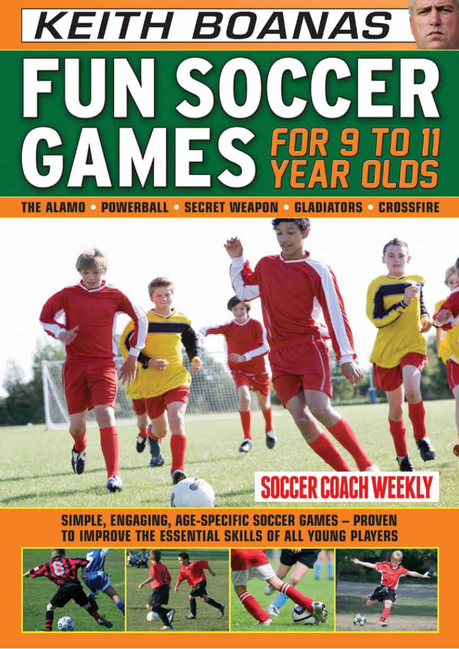Book Shop

Fun Soccer Games for 9 to 11 Year Olds
Make a mazy run before putting a cross in, deal with non-stop throw-ins, and judge the correct weight to stop a ball in a precise spot. These are all skills learned through games with the help of Fun Soccer Games for 9 to 11 year olds.
Authored by Keith Boanas, a 35-year veteran of the game as an English Football Association Coach Educator, these are some of his favourite games, tried and tested on generations of youngsters. They are designed to energise and excite your little players without putting too much pressure on you!
Keith’s skill in this best-selling and value for money manual is to convert basic soccer skills into games linked to fun and excitement and subjects the kids identify with. The approach is not about barking orders but encouraging effort, flair, teamwork by letting the game be the teacher.
This age group presents a slight challenge in that they are more aware of the “real” game – and some games reflect this. The manual also contains Keith’s 25 Top Tips for Coaching 9 to 11 Year Olds.more
Children view drills for exactly what they are, boring and monotonous. If you keep running drills not only will you lose your player’s interest, ultimately, you will lose your players. No child is going to come to your sessions week after week if they are not having fun. So how do you overcome this? The answer is simple, play games.
What can Fun Soccer Games for 9 to 11 Year Olds do for your players?
– Teach basic soccer skills. Games are the best way to teach a range of skills. All of the basics such as passing, shooting, dribbling, heading are covered.
– Let them have fun. At this age, above all else, children want to have fun. That’s why the soccer authorities in the UK and United States back the idea of fun games.Games are fun which is why we continue to play them well into adulthood. Top soccer matches are still games, they’ve just developed a more competitive, and commercial, edge.
– Engage them. How do you get a child to buy into your games? Make them engaging.
– Educate. Games can educate your players beyond the learning of basic skills. These games are based on simple rules and educate players in simple ideas such as right and wrong. They are introduced with achievable, desirable objectives.
– Promote teamwork. Young children can be selfish, they’re not always keen to share their toys and they strive to achieve objectives independently. The games introduce teamwork in a variety of ways, working independently, in pairs, and in a group. The majority of games require one ball per player so that everyone can be involved even though the games are all team based.
– Fire their creativity. These games work, but you should never be afraid to make changes, to the rules, the playing area, or even the premise of the game. You can even let them change the rules. It’s a case of how would they like to play the game as much as how should they play the game.
– Keep them coming back. If young children play a game and enjoy it you can be sure they’ll want to keep on playing. Your youngsters are going to latch on to these games and want to play them over and over again. Ask what game they want to play and off you go. They’ll be back week after week, there’s a big difference between consistent fun and monotony.
This is a digital download
Soccer Coach Weekly offers proven and easy to use soccer drills, coaching sessions, practice plans, small-sided games, warm-ups, training tips and advice.
We've been at the cutting edge of soccer coaching since we launched in 2007, creating resources for the grassroots youth coach, following best practice from around the world and insights from the professional game.